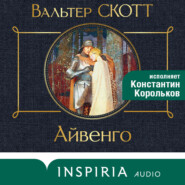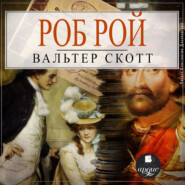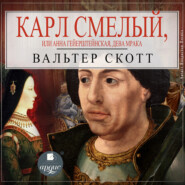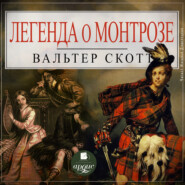По всем вопросам обращайтесь на: info@litportal.ru
(©) 2003-2024.
✖
The Fortunes of Nigel
Настройки чтения
Размер шрифта
Высота строк
Поля
I may add, as every thing concerning George Heriot is interesting, that his second wife, Alison Primrose, was interred in Saint Gregory’s Church, from the register of which parish the Rev. Mr. Barham, Rector, has, in the kindest manner, sent me the following extract: – “Mrs. Alison, the wife of Mr. George Heriot, gentleman, 20th April, 1612.” Saint Gregory’s, before the Great Fire of London which consumed the Cathedral, formed one of the towers of old Saint Paul’s, and occupied the space of ground now filled by Queen Anne’s statue. In the south aisle of the choir Mrs. Heriot reposed under a handsome monument, bearing the following inscription: —
“Sanctissimae et charissimae conjugi ALISONAE HERIOT, Jacobi Primrosii, Regia Majestatis in Sanctiori Concilio Regni Scotia Amanuensis, filiae, fernina omnibus turn animi turn corporis dotibus, ac pio cultu instructissimae, maestissimus ipsius maritus GEORGIUS HERIOT, ARMIGER, Regis, Reginae, Principum Henrici et Caroli Gemmarius, bene merenti, non sine lachrymis, hoc Monumentum pie posuit.
“Obiit Mensis Aprilis die 16, anno salutis 1612, aetatis 20, in ipso flore juventae, et mihi, parentibus, et amicis tristissimum sui desiderium reliquit.
Hic Alicia Primrosa
Jacet crudo abruta fato,
Intempestivas
Ut rosa pressa manus.
Nondum bisdenos
Annorum impleverat orbes,
Pulchra, pudica,
Patris delicium atque viri:
Quum gravida, heu! Nunquam
Mater, decessit, et inde
Cura dolorq: Patri,
Cura dolorq: viro.
Non sublata tamen
Tantum translata recessit;
Nunc Rosa prima Poli
Quae fuit antea soli.”
The loss of a young, beautiful, and amiable partner, at a period so interesting, was the probable reason of her husband devoting his fortune to a charitable institution. The epitaph occurs in Strype’s edition of Stewe’s Survey of London, Book iii., page 228.
Note III. p. 39. – PROCLAMATION AGAINST THE SCOTS COMING TO ENGLAND
The English agreed in nothing more unanimously than in censuring James on account of the beggarly rabble which not only attended the King at his coming first out of Scotland, “but,” says Osborne, “which, through his whole reign, like a fluent spring, were found still crossing the Tweed.” Yet it is certain, from the number of proclamations published by the Privy Council in Scotland, and bearing marks of the King’s own diction, that he was sensible of the whole inconveniences and unpopularity attending the importunate crowd of disrespectable suitors, and as desirous to get rid of them as his Southern subjects could be. But it was in vain that his Majesty argued with his Scottish subjects on the disrespect they were bringing on their native country and sovereign, by causing the English to suppose there were no well-nurtured or independent gentry in Scotland, they who presented themselves being, in the opinion and conceit of all beholders, “but idle rascals, and poor miserable bodies.” It was even in vain that the vessels which brought up this unwelcome cargo of petitioners were threatened with fine and confiscation; the undaunted suitors continued to press forward, and, as one of the proclamations says, many of them under pretence of requiring payment of “auld debts due to them by the King,” which, it is observed with great naivete, “is, of all kinds of importunity, most unpleasing to his Majesty.” The expressions in the text are selected from these curious proclamations.
NOTE IV. p. 59. – KING JAMES
The dress of this monarch, together with his personal appearance, is thus described by a contemporary: —
“He was of a middle stature, more corpulent through [i.e. by means of] his clothes than in his body, yet fat enough. His legs were very weak, having had, as was thought, some foul play in his youth, or rather before he was born, that he was not able to stand at seven years of age. That weakness made him ever leaning on other men’s shoulders. His walk was even circular; his hands are in that walk ever fiddling about – [a part of dress now laid aside]. He would make a great deal too bold with God in his passion, both with cursing and swearing, and a strain higher verging on blasphemy; but would, in his better temper, say, he hoped God would not impute them as sins, and lay them to his charge, seeing they proceeded from passion. He had need of great assistance, rather than hope, that would daily make thus bold with God.” – DALZELL’S Sketches of Scottish History , p. 86.
NOTE V. p. 78. – SIR MUNGO MALAGROWTHER
It will perhaps be recognised by some of my countrymen, that the caustic Scottish knight, as described in the preceding chapter, borrowed some of his attributes from a most worthy and respectable baronet, who was to be met with in Edinburgh society about twenty-five or thirty years ago. It is not by any means to be inferred, that the living person resembled the imaginary one in the course of life ascribed to him, or in his personal attributes. But his fortune was little adequate to his rank and the antiquity of his family; and, to avenge himself of this disparity, the worthy baronet lost no opportunity of making the more avowed sons of fortune feel the edge of his satire. This he had the art of disguising under the personal infirmity of deafness, and usually introduced his most severe things by an affected mistake of what was said around him. For example, at a public meeting of a certain county, this worthy gentleman had chosen to display a laced coat, of such a pattern as had not been seen in society for the better part of a century. The young men who were present amused themselves with rallying him on his taste, when he suddenly singled out one of the party: – “Auld d’ye think my coat – auld-fashioned? – indeed it canna be new; but it was the wark of a braw tailor, and that was your grandfather, who was at the head of the trade in Edinburgh about the beginning of last century.” Upon another occasion, when this type of Sir Mungo Malagrowther happened to hear a nobleman, the high chief of one of those Border clans who were accused of paying very little attention in ancient times to the distinctions of Meum and Tuum, addressing a gentleman of the same name, as if conjecturing there should be some relationship between them, he volunteered to ascertain the nature of the connexion by saying, that the “chief’s ancestors had stolen the cows, and the other gentleman’s ancestors had killed them,” – fame ascribing the origin of the latter family to a butcher. It may be well imagined, that among a people that have been always punctilious about genealogy, such a person, who had a general acquaintance with all the flaws and specks in the shields of the proud, the pretending, and the nouveaux riches, must have had the same scope for amusement as a monkey in a china shop.
Note VI. p. 98. – MRS. ANNE TURNER
Mrs. Anne Turner was a dame somewhat of the occupation of Mrs. Suddlechop in the text; that is, half milliner half procuress, and secret agent in all manner of proceedings. She was a trafficker in the poisoning of Sir Thomas Overbury, for which so many subordinate agents lost their lives, while, to the great scandal of justice, the Earl of Somerset and his Countess were suffered to escape, upon a threat of Somerset to make public some secret which nearly affected his master, King James. Mrs. Turner introduced into England a French custom of using yellow starch in getting up bands and cuffs, and, by Lord Coke’s orders, she appeared in that fashion at the place of execution. She was the widow of a physician, and had been eminently beautiful, as appears from the description of her in the poem called Overbury’s Vision. There was produced in court a parcel of dolls or puppets belonging to this lady, some naked, some dressed, and which she used for exhibiting fashions upon. But, greatly to the horror of the spectators, who accounted these figures to be magical devices, there was, on their being shown, “heard a crack from the scaffold, which caused great fear, tumult, and confusion, among the spectators and throughout the hall, every one fearing hurt, as if the devil had been present, and grown angry to have his workmanship showed to such as were not his own scholars.” Compare this curious passage in the History of King James for the First Fourteen Years, 1651, with the Aulicus Coquinarius of Dr. Heylin. Both works are published in the Secret History of King James.
Note VII. p. 110. – LORD HUNTINGLEN
The credit of having rescued James I. from the dagger of Alexander Ruthven, is here fictitiously ascribed to an imaginary Lord Huntinglen. In reality, as may be read in every history, his preserver was John Ramsay, afterwards created Earl of Holderness, who stabbed the younger Ruthven with his dagger while he was struggling with the King. Sir Anthony Weldon informs us, that, upon the annual return of the day, the King’s deliverance was commemorated by an anniversary feast. The time was the fifth of August, “upon which,” proceeds the satirical historian, “Sir John Ramsay, for his good service in that preservation, was the principal guest, and so did the King grant him any boon he would ask that day. But he had such limitation made to his asking, as made his suit as unprofitable, as the action for which he asked it for was unserviceable to the King.”
Note VIII. p. 115. – BUCKINGHAM
Buckingham, who had a frankness in his high and irascible ambition, was always ready to bid defiance to those by whom he was thwarted or opposed. He aspired to be created Prince of Tipperary in Ireland, and Lord High Constable of England. Coventry, then Lord Keeper, opposed what seemed such an unreasonable extent of power as was annexed to the office of Constable. On this opposition, according to Sir Anthony Weldon, “the Duke peremptorily accosted Coventry, ‘Who made you Lord Keeper, Coventry?’ He replied, ‘The King.’ Buckingham replied, ‘It’s false; ‘twas I did make you, and you shall know that I, who made you, can, and will, unmake you.’ Coventry thus answered him, ‘Did I conceive that I held my place by your favour, I would presently unmake myself, by rendering up the seals to his Majesty.’ Then Buckingham, in a scorn and fury, flung from him, saying, ‘You shall not keep it long;’ and surely, had not Felton prevented him, he had made good his word.” – WELDON’S Court of King James and Charles.
Note IX. p. 134. – PAGES IN THE SEVENTEENTH CENTURY
About this time the ancient customs arising from the long prevalence of chivalry, began to be grossly varied from the original purposes of the institution. None was more remarkable than the change which took place in the breeding and occupation of pages. This peculiar species of menial originally consisted of youths of noble birth, who, that they might be trained to the exercise of arms, were early removed from their paternal homes, where too much indulgence might have been expected, to be placed in the family of some prince or man of rank and military renown, where they served, as it were, an apprenticeship to the duties of chivalry and courtesy. Their education was severely moral, and pursued with great strictness in respect to useful exercises, and what were deemed elegant accomplishments. From being pages, they were advanced to the next gradation of squires; from squires, these candidates for the honours of knighthood were frequently made knights.
But in the sixteenth century the page had become, in many instances, a mere domestic, who sometimes, by the splendour of his address and appearance, was expected to make up in show for the absence of a whole band of retainers with swords and bucklers. We have Sir John’s authority when he cashiers part of his train.
“Falstaff will learn the humour of the age,
French thrift, you rogues, myself and skirted page.”
Jonson, in a high tone of moral indignation, thus reprobated the change. The Host of the New Inn replies to Lord Lovel, who asks to have his son for a page, that he would, with his own hands hang him, sooner
“Than damn him to this desperate course of life.
LOVEL. Call you that desperate, which, by a line
Of institution, from our ancestors
Hath been derived down to us, and received
In a succession, for the noblest way
Of brushing up our youth, in letters, arms,
Fair mien, discourses civil, exercise,
And all the blazon of a gentleman?
Where can he learn to vault, to ride, to fence,
To move his body gracefully, to speak
The language pure, or to turn his mind
Or manners more to the harmony of nature,
Than in these nurseries of nobility?
HOST. Ay, that was when the nursery’s self was noble,
And only virtue made it, not the market,
That titles were not vended at the drum
And common outcry; goodness gave the greatness,
And greatness worship; every house became
An academy, and those parts
We see departed in the practice now
Quite from the institution.
LOVEL. Why do you say so,
Or think so enviously? do they not still
Learn us the Centaur’s skill, the art of Thrace,
To ride? or Pollux’ mystery, to fence?
The Pyrrhick gestures, both to stand and spring
In armour; to be active for the wars;
To study figures, numbers and proportions,
May yield them great in counsels and the art;
To make their English sweet upon their tongue?
As reverend Chaucer says.
HOST. Sir, you mistake;
To play Sir Pandarus, my copy hath it,
And carry messages to Madam Cressid;
Instead of backing the brave steed o’mornings.
To kiss the chambermaid, and for a leap
O’ the vaulting horse, to ply the vaulting house;

















